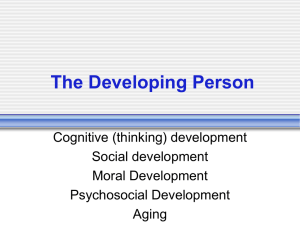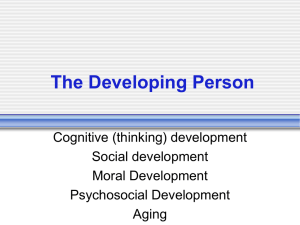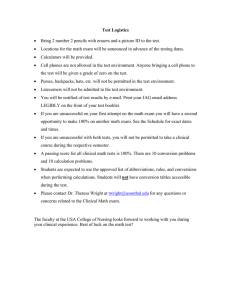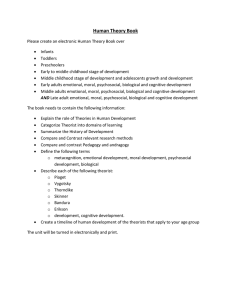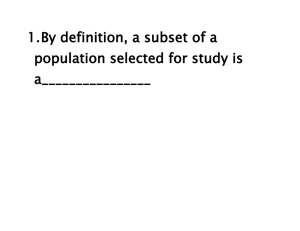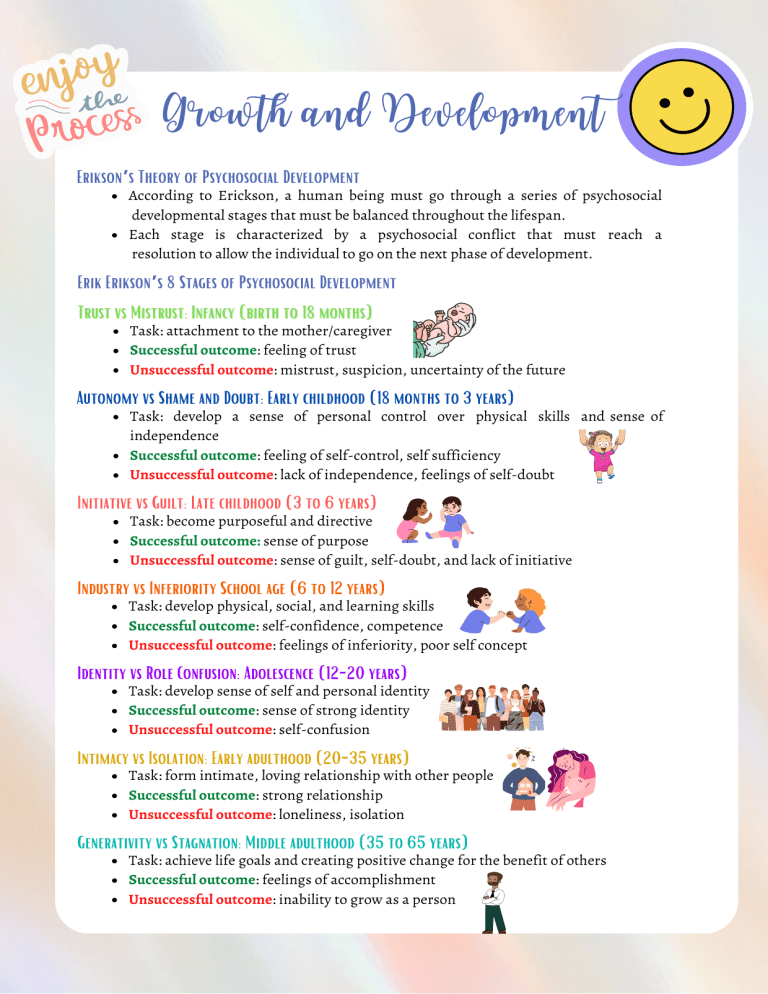
Growth and Development Erikson’s Theory of Psychosocial Development According to Erickson, a human being must go through a series of psychosocial developmental stages that must be balanced throughout the lifespan. Each stage is characterized by a psychosocial conflict that must reach a resolution to allow the individual to go on the next phase of development. Erik Erikson’s 8 Stages of Psychosocial Development Trust vs Mistrust: Infancy (birth to 18 months) Task: attachment to the mother/caregiver Successful outcome: feeling of trust Unsuccessful outcome: mistrust, suspicion, uncertainty of the future Autonomy vs Shame and Doubt: Early childhood (18 months to 3 years) Task: develop a sense of personal control over physical skills and sense of independence Successful outcome: feeling of self-control, self sufficiency Unsuccessful outcome: lack of independence, feelings of self-doubt Initiative vs Guilt: Late childhood (3 to 6 years) Task: become purposeful and directive Successful outcome: sense of purpose Unsuccessful outcome: sense of guilt, self-doubt, and lack of initiative Industry vs Inferiority School age (6 to 12 years) Task: develop physical, social, and learning skills Successful outcome: self-confidence, competence Unsuccessful outcome: feelings of inferiority, poor self concept Identity vs Role Confusion: Adolescence (12-20 years) Task: develop sense of self and personal identity Successful outcome: sense of strong identity Unsuccessful outcome: self-confusion Intimacy vs Isolation: Early adulthood (20-35 years) Task: form intimate, loving relationship with other people Successful outcome: strong relationship Unsuccessful outcome: loneliness, isolation Generativity vs Stagnation: Middle adulthood (35 to 65 years) Task: achieve life goals and creating positive change for the benefit of others Successful outcome: feelings of accomplishment Unsuccessful outcome: inability to grow as a person Integrity vs Despair: Late adulthood (65 years to death) Task: reflection on life Successful outcome: sense of fulfillment and integrity Unsuccessful outcome: regret, bitterness, dissatisfaction with life Jean Piaget’s Theory of Cognitive Development The theory focuses on concepts of language, scientific reasoning, memory, and moral development. According to Piaget, to progress from one stage to the next, the child reorganizes his or her thinking process to bring them close to reality. 4 Stages of Cognitive Development Sensorimotor stage (birth to 2 years) Present at birth, the infant/child uses reflexes like sucking, grasping, looking, and listening to gain an understanding about the environment. Object permanence (objects continue to exist even though it can no longer be seen or heard) and separation anxiety develops in this stage. Preoperational stage (2 to 7 years) The child begins to use language and think symbolically. Egocentrism (inability to see a situation from another person’s point of view) is evident in this stage. Comprehends simple abstract but thinking is usually concrete and literal Concrete operational stage (7 to 11 years) The child can think logically but can only apply it to physical objects. The child starts to use concepts of number, time, space, and volume. Formal operational stage (11 years to adulthood) Individuals demonstrate the ability to think abstractly, reason logically, and draw conclusions. Can engage in hypothetical thinking and scientific reasoning. SIGMUND FREUD's PSYCHOSOCIAL DEVELOPMENT According to Freud, the child’s development goes through a series of psychosexual stages in which the child’s desires become focused on a particular body part. Each stage is presented with a conflict that will help build or suppress growth depending on how they are resolved. Stages of Psychosocial Development Oral stage (birth to 1 year) Mouth is the center of gratification through sucking, chewing, swallowing, breastfeeding, and biting. Improper resolution in this stage, may lead to oral fixation habits such as nailbiting, thumb sucking, smoking, and excessive drinking. Anal stage (1 to 3 years) Child finds pleasure and sense of control through retention and defecation of feces Toilet training is present that provides the child a sense of self-control. Parents that are too lenient during toilet training will result in an anal-expulsive personality which includes being messy, disorganized, rebellious, and careless. Parents that are too strict or start toilet training too early will result to anal-retentive personality which includes being overly obsessive, and rigid. Phallic stage (3 to 6 years) Interest in the genital area and masturbation are sources of pleasure in this stage. Awareness of sexual difference can result in Oedipus complex (Electra complex in women), an unconscious desire for the parent of the opposite sex while developing a conflict for the parent of the same-sex Latent stage (6 to 12 years) Sexual urges diminish and children start to channel their sexual energies in honing their values and developing their new skills to form relationships with other people. Fixation in this stage can lead to immaturity and a failure to form relationships as an adult. Genital stage (12 years to adulthood) Starts with the onset of puberty when physical maturity prepares the body for reproduction. Individuals starts to develop sexual and emotional interest towards the opposite sex. Lawrence Kohlberg’s Theory of Moral Development Kohlberg believed that a person can acquire knowledge of moral values through active thinking and reasoning. Stages of Moral Development Level 1: Preconventional Morality Stage 0 (birth to 2 years). Egocentric Judgement: no concept of right or wrong Stage 1 (2 to 3 years). Obedience and Punishment: behavior driven by avoiding punishment. Stage 2 (4 to 7 years). Individualism and Exchange: behavior is driven by rewards or have favors returned. Level 2: Conventional Morality Stage 3 (7 to 10 years). Good Boy- Nice Girl Orientation: behavior is determined by social approval. Stage 4 (10-12 years). Law and Order Orientation: social rules and laws determine behavior. Level 3: Postconventional Morality Stage 5: Social Contract and Legalistic Orientation: rules and laws exist for the greater good of all. Stage 6: Universal Ethical Principles Orientation: development of own moral principles even if they conflict with the law of the society. Physiologic Growth and development Weight. Most babies doubled their weight at the rate of 5 to 7 ounce weekly for 6 months and tripled at 12 months. Length. A growth of 1.5 to 2.5 cm is seen monthly from birth to age 6 months while a growth of 1 cm per month is expected from ages 6 to 12 months. Fontanel. Anterior fontanel closes by 12 to 18 months of age; Posterior fontanel closes by the end of the second month. Head circumference. The average head circumference of a newborn is about 33 to 35 cm, 2 to 3 cm more than chest circumference. Teeth. Lower front teeth normally appear by the age of 5 to 9 months while upper front teeth begin to appear by 8 to 12 months. All deciduous teeth (20 in total) will erupt by the 2 ½ years of age. Developmental Milestones 2 to 3 months Begin to smile Coos, makes gurgling noises Turn head toward sounds Follow objects with eyes Hold head and chest up when prone 4 to 5 months Smile spontaneously Cooing and babbling when spoken to Grasp objects Rolls over by self Hold head steady, unsupported 6 to 7 months Recognize familiar faces and begins to show fear of strangers May say vowel sounds when babbling (oh oh) and imitate sounds Responds when own name is heard Sit with support Rolls back and forth and vice versa Show feelings of joys and annoyance 8 to 9 months Say first words such as (ma-ma-ma, ba-ba-ba) Uses index finger and thumb to pick up objects Can sit securely unsupported Crawls Stands, holding on Begin to stand without help 10 to 11 months Use simple gestures such as waving “bye-bye” Walk with support while holding onto objects Stand alone 12 months Say simple words like “mama” or “dada” Get to a sitting position with no help Can drink from a cup and hold spoon to feed self 15 to 18 months Say several single words Understand and follow simple instructions Can point to one body part Walks alone Walk up and down stairs while holding on Can help undress oneself

